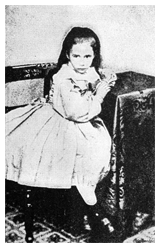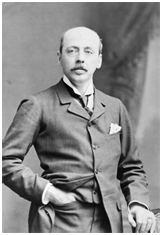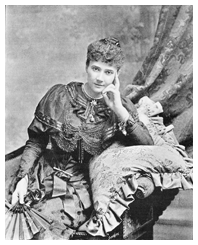Profile of Lady Colin Campbell
 Lady Colin Campbell was born Gertrude Elizabeth Blood in May 1857. She enjoyed a liberal upbringing for the day, and developed into an intelligent, artistic and beautiful young woman. Much of her childhood was spent in Europe, so she was equally at ease in English, Italian and French. A smattering of German, Spanish and Arabic added to her renown as an accomplished linguist. She loved sport, art and singing, and excelled at whatever she undertook.
Lady Colin Campbell was born Gertrude Elizabeth Blood in May 1857. She enjoyed a liberal upbringing for the day, and developed into an intelligent, artistic and beautiful young woman. Much of her childhood was spent in Europe, so she was equally at ease in English, Italian and French. A smattering of German, Spanish and Arabic added to her renown as an accomplished linguist. She loved sport, art and singing, and excelled at whatever she undertook. In October 1880 she visited family friends staying in Scotland and met Lord Colin Campbell, MP and youngest son of the 8th Duke of Argyll. Within three days they were engaged, and despite his family's objections they married the following year. As Lady Colin Campbell, she was launched into an elevated social circle where she enjoyed the company of royalty, eminent politicians, and famous names of the day. But all was not well at home, as the couple's incompatibility became glaringly apparent. Despite desperate family attempts at mediation the marriage broke down irrevocably and ended up in the dreaded divorce courts. She accused him of adultery and cruelty. He accused her of adultery with four co-respondents and scandalised society with such a suggestion. A Duke, a general, a doctor, and a fire-chief were all named by Lord Colin in his thirst for victory in what was to become one of the longest divorce trials in English legal history.
In October 1880 she visited family friends staying in Scotland and met Lord Colin Campbell, MP and youngest son of the 8th Duke of Argyll. Within three days they were engaged, and despite his family's objections they married the following year. As Lady Colin Campbell, she was launched into an elevated social circle where she enjoyed the company of royalty, eminent politicians, and famous names of the day. But all was not well at home, as the couple's incompatibility became glaringly apparent. Despite desperate family attempts at mediation the marriage broke down irrevocably and ended up in the dreaded divorce courts. She accused him of adultery and cruelty. He accused her of adultery with four co-respondents and scandalised society with such a suggestion. A Duke, a general, a doctor, and a fire-chief were all named by Lord Colin in his thirst for victory in what was to become one of the longest divorce trials in English legal history. After the acrimonious trial the couple went their separate ways. Lord Colin was indebted, embittered, and an embarrassment to his prominent family. He was also a sick man. Lady Colin soon discovered that high society no longer feted her, but rather than decline into safe obscurity she slowly created a new life for herself as a writer. The bulk of her work was journalism, with regular columns on art and travel. She also wrote about her favourite sports of cycling, fencing and fishing, about music and the theatre, decorating and etiquette. She founded a weekly journal, tried her hand at a novel and two plays, and got involved in editing and translating books.
After the acrimonious trial the couple went their separate ways. Lord Colin was indebted, embittered, and an embarrassment to his prominent family. He was also a sick man. Lady Colin soon discovered that high society no longer feted her, but rather than decline into safe obscurity she slowly created a new life for herself as a writer. The bulk of her work was journalism, with regular columns on art and travel. She also wrote about her favourite sports of cycling, fencing and fishing, about music and the theatre, decorating and etiquette. She founded a weekly journal, tried her hand at a novel and two plays, and got involved in editing and translating books.Although shunned by much of society, her beauty, intelligence and wit were welcome in the more liberal circles of artists and writers. She was a close friend of the artist and dandy Whistler, and knew the Burne-Jones's, Louise Jopling and Kate Greenaway. In the world of letters her work brought her into contact with famous editors and writers of the day. George Bernard Shaw listened to her advice on his early work, and remained a life-long friend, and Henry James used to visit her. But she had her enemies. She exchanged insults with Oscar Wilde, and was disliked by the notorious editor and newspaper proprietor Frank Harris.
 Lady Colin was a friend and inspiration to many a name still famous today. In her writings she advocated ideas such as bicycle lanes on roads, cremation as an alternative to burial, and equal smoking rights for women. When many women in her place would have quietly retired to the country, or found refuge in their "nerves", she carved herself a career, threw herself into her sports, and created a new life as an independent woman. Yet for all her energy and foresight, her talents and beauty, she remains unknown except for her sensational divorce trial. The few references in books cruelly describe her as a nymphomaniac, sex goddess or houri. Anne Jordan's biography aims to redress the balance and give her life a full and fair hearing. The book tells the story of one of the most gifted women of her day and shows how little the sensationalist epithets convey of the woman that Shaw interviewed in 1893.
Lady Colin was a friend and inspiration to many a name still famous today. In her writings she advocated ideas such as bicycle lanes on roads, cremation as an alternative to burial, and equal smoking rights for women. When many women in her place would have quietly retired to the country, or found refuge in their "nerves", she carved herself a career, threw herself into her sports, and created a new life as an independent woman. Yet for all her energy and foresight, her talents and beauty, she remains unknown except for her sensational divorce trial. The few references in books cruelly describe her as a nymphomaniac, sex goddess or houri. Anne Jordan's biography aims to redress the balance and give her life a full and fair hearing. The book tells the story of one of the most gifted women of her day and shows how little the sensationalist epithets convey of the woman that Shaw interviewed in 1893.Imagine a lady with a lightning wit, a merciless sense of humour, a skill in journalism surpassing that of any interviewer, a humiliatingly obvious power of reckoning you up at a glance, and probably not thinking much of you, a superb bearing that brings out all the abjectness in your nature, and a beauty the mere fame of which makes you fall into an attitude of amateurishly gallant homage that fulfils the measure of your sneaking confusion. The custom is for the interviewer to describe the subject of an interview as his "victim". It is not possible to express how completely the tables were turned on this occasion.
George Bernard Shaw